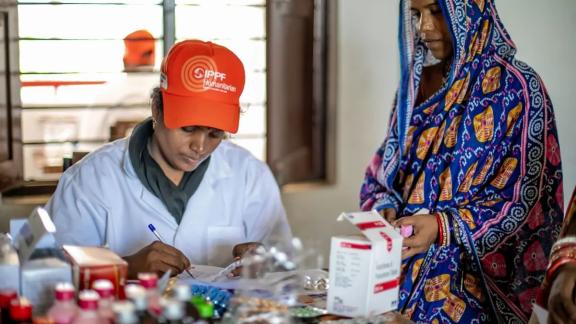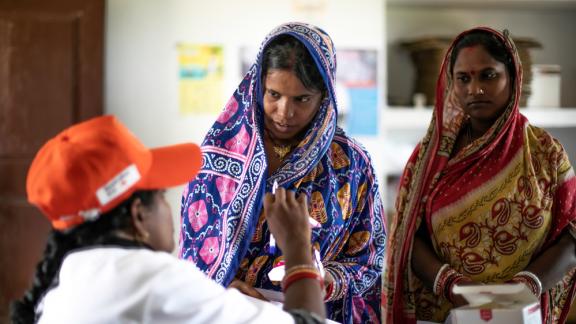The Need for Urgent Action
Every year, nearly 6,500 adolescent girls die in childbirth in South Asia. As per the World Bank, the prevalence of lifetime intimate partner violence is 35% higher than the global average in the region. Women and girls in Asia—and around the world—are still being denied their sexual and reproductive rights and exposed to sexual and gender-based violence, with marginalized women facing higher levels of SGBV. This systemic oppression rooted in gender and sexuality will continue to claim the lives of women and girls.
With just five years left to achieving Agenda 2030, urgent action is needed to secure a future where every woman’s rights are fully respected. Empowering women and girls, and ensuring they have control over their bodies and reproductive choices, is a key aspect of gender equality. This empowerment leads to better health outcomes and enables women to participate fully in social, economic, and political life.
This International Women’s Day, we ask for “Rights. Equality. Empowerment” for ALL women and girls. The year marks 30 years of adoption of the Beijing Declaration and Platform for Action and the progress made for all women and girls everywhere.
At the same time, sexual and reproductive rights are becoming increasingly precarious on the global stage. Newer challenges and sanctions, including a strong anti-rights movement, armed conflicts, climate crises, diminishing trust in democracy and the deliberate erosion of human rights by those in power are pushing us far back in time. The recent rollbacks on bodily autonomy are stripping millions of women and girls of their inherent right to choose, undermining their fundamental sexual and reproductive rights.
Sexual and Reproductive Rights for All
The International Planned Parenthood Federation emphasizes that the link between gender equality and sexual and reproductive health, rights and justice (SRHRJ) is fundamental and reciprocal. Achieving one is essential for the realization of the other, and both are necessary for the overall well-being and empowerment of individuals in all their diversity. Through our work we will continue to highlight the intersectional and cross-cutting nature of pervasive gender inequalities and power imbalances. Gender inequality, harmful gender norms and stigma are still extensive, such as the promotion of a heterosexual ideal putting lesbian, gay, bisexual and transgender people at increased risk. These harmful norms, bred by colonial and neo-liberal development structures have shaped anti-LGBTI+ legal legacy of western colonialism which continues to plague the global South.
when
region
South Asia

“Gender equality cannot be addressed in isolation. For us, gender equality means equality of opportunity for all women and girls across the gender spectrum, intersex and transgender people. It signifies an aspiration to transform structural inequalities, behaviour patterns and social norms." - Tomoko Fukuda, Regional Director (interim), IPPF South Asia Region (IPPF SAR)

As a global movement to protect the sexual and reproductive rights of all people, we advocate for reproductive justice, a framework which looks at human rights with a focus on the ways systemic oppression affects people's agency over their own bodies and decision making about their families. This framework recognizes and responds to the fact that many aspects of society must change for people who experience oppression based on gender, and other aspects of identity.
“Gender equality cannot be addressed in isolation. For us, gender equality means equality of opportunity for all women and girls across the gender spectrum, intersex and transgender people. It signifies an aspiration to transform structural inequalities, behaviour patterns and social norms. While we have international instruments to hold governments accountable, there are countless examples of failures especially when it comes to women living with HIV, women across the gender spectrum, women in sex work, women living with disabilities, indigenous women, migrant women, women of colour. Addressing inequalities for ALL women and girls requires prioritising the needs of marginalised communities. It is a matter of equity, justice, and the indivisibility of fundamental human rights,” says Tomoko Fukuda, Regional Director (interim), IPPF South Asia Region (IPPF SAR).
Investing in Gender Equality
Research has also shown that investing in women and girls and for greater gender parity delivers significant economic benefits. Gender-focused development policies and programs in Bangladesh have contributed to improvements in maternal health and girls’ education, boosting its local economy. In Afghanistan, where majority of girls are kept of schools, this impacts the country’s long-term development. Investing in gender equality is not just a moral imperative, it also drives growth, reduces poverty and strengthens vulnerable communities. Yet, as a new report by Oxfam highlights, total global funding for women’s rights groups hasn’t increased since 2011—exposing a severe underinvestment in women’s futures.
The International Planned Parenthood Federation’s (IPPF) 'Come Together - Strategic Plan 2028' is a comprehensive blueprint for accelerating gender equality via realising SRHRJ for all, ensuring that no one is left behind with a focus on empowering young people. IPPF SAR, along with its Member Associations, will keep pushing for policy and legal reforms including the decriminalization of abortion, comprehensive sexuality education, and access to stigma-free, inclusive sexual and reproductive care. We are acting with young people, activists and social movements to challenge norms. We will also continue to defend the voices of all underrepresented women and girls who are speaking up against the systems of oppression and injustice.
This International Women’s Day, we call out to our civil society partners, feminists, advocates and communities to come together for a world where gender and sexuality are no longer a source of inequality or stigma. For more than 70 years, we have remained undeterred in our fight for gender equality, and we are not about to back down now.











